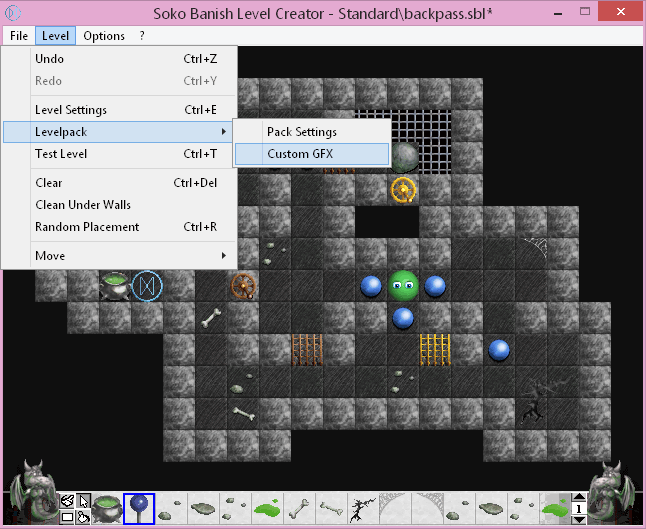Testing!
Levels can now be tested via a handy menu option in the editor, which calls sokobanish.exe from wherever it is located on the harddrive and opens the level in it – you don’t even have to save! Once you finish or quit, the game closes automatically. This is possible due to some sneaky magic razzle-dazzle and fairy farts I added to the game with the 1.4.1 update, so be sure that’s at least the version you’re using before trying to test levels.
Managing Files!
The info.txt, levels.txt and custom graphics, that is. One of the things that’s been bothering me was the levelpacks’ reliance on external files that have to be added to the folder (with the correct names and formatting) manually. It’s not exactly convenient. The new in-editor interface not only lets you import/create them more easily, but also gives you an overview of all the custom graphics currently in the pack and a browseable list of levels, complete with previews and level info so you know exactly what level you’re moving where. You can even hide the extra info so you don’t know what you’re doing anymore. Gnarly!
 |
| The menu, please. |
Undo & Redo!
This is a big one and was competing for top spot with the other two. (It finished in third, but nothing it can do about that.) If you ever accidentally turn your walls into ghosts and fill up the whole place with 173 cauldrons (it happens to everyone!) you can now undo your mistakes and no one will ever know. No one! Except you. Ten (10) revisions are saved, though this number can be customised by manually editing the less and less appropriately named “toolbars.ini”.
Random Placement!
An idea I’ve been toying with for a while is a randomiser function, and now it’s here. Well, not yet, but you get the idea. Simply input a density in percent and the editor will randomly spread the selected object across the level or the selected area. Now you don’t even have to build it yourself! (Note: For an actual fun and solvable level, you still have to build it yourself.)
Counting!
One rune circle! Two rune circles! Three rune circles! Ah-ah-ah! And if you don’t have a vampire to do it for you, the select tool will now count elements by pointing at them. If an area is selected, only objects inside it are counted, and if there are too few rune circles in the level, a status bar with a warning pops up that tells you how many are missing. Nifty!
